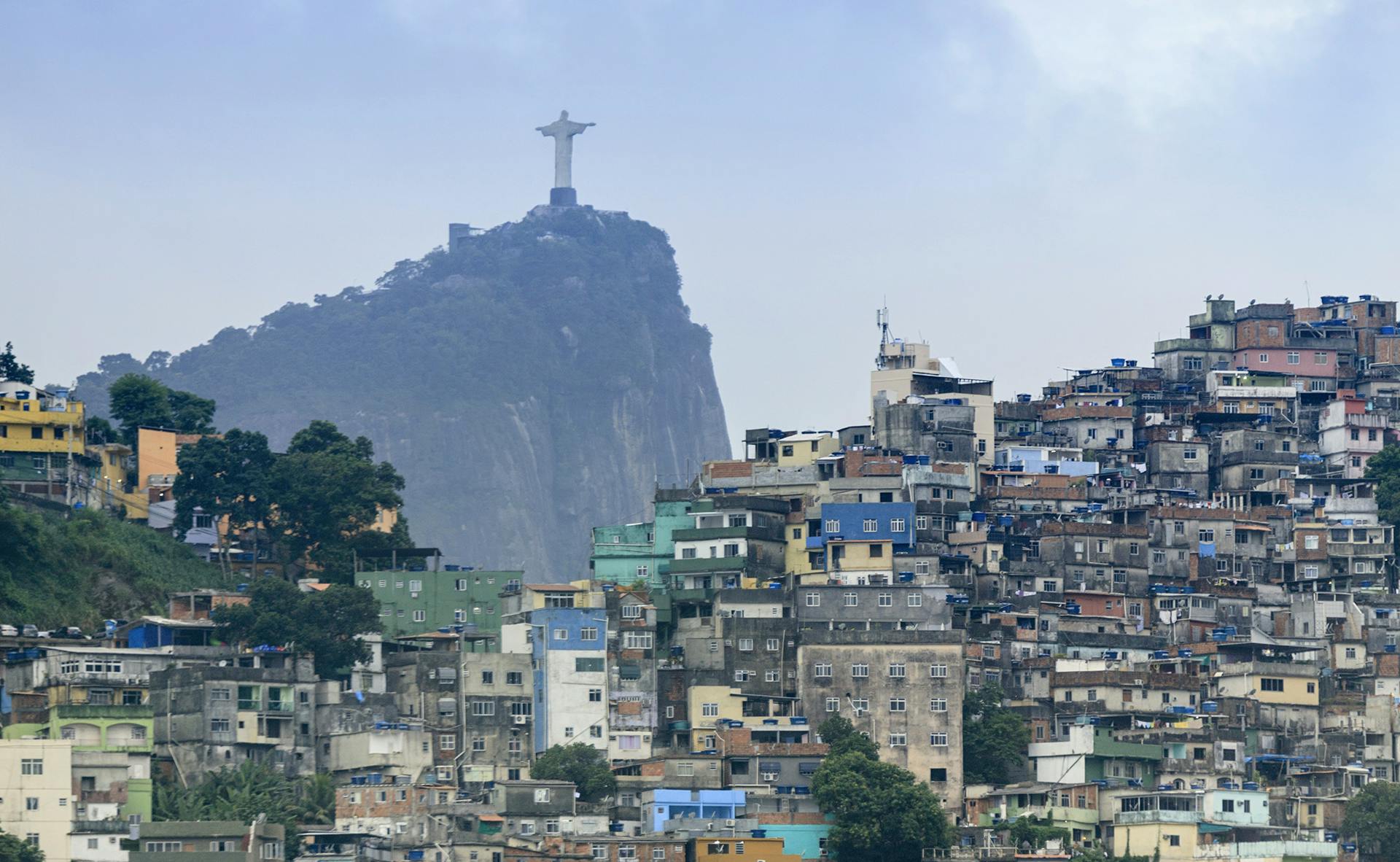A bridge connects Brazil's largest favela, a densely packed urban slum in Rio de Janeiro, to some of the country’s most expensive real estate. Set above four lanes of traffic on one side is the mountainside Rocinha favela, and on the other a cluster of towering luxury apartments just minutes from the beach. If you stand in the middle long enough, observing the two directions of cars whizzing by below, you’ll notice the flow is decidedly heavier in one direction. It’s not that people aren’t moving both ways, it’s that people from only one side, the favela, are coming and going.
It’s here in this concrete metaphor that Amber Johnston meets me with a whirl of Down Under enthusiasm. Looking both ways, first to the morro (the hill) and then to the asfolto (the asphalt), as these two different worlds are called in Brazilian Portuguese, the Australian expat tells me just what she is doing here in Rio de Janeiro, after leaving her life as a successful media saleswoman in Sydney’s central city three years ago.
“It’s actually a little personal pleasure of mine taking Brazilians into a favela and showing them for the first time,” she said. “And you know some Brazilians are indoctrinated and scared, and sometimes with good reason, about favela life. So I see myself as a bridge between middle-class Brazilians and people in communities. I hate using the words ‘slum’ or ‘favela’—it’s a community, it’s where people live, it’s their homes.”
Rocinha is home to over 200,000 people in one steep square mile. It is a sight to behold from below. At night, with everybody home, the tightly packed hillside sparkles like a sea of fairy lights. For most of Rio’s middle class, the closest they come is hurtling by on the bus or squinting up at it from neighboring upper-class São Conrado. It’s a place often looked at but rarely truly seen. Johnston is changing that.
Until ten years ago, Rio’s favelas were off-limits to outsiders. But since the 2008 pacification program began introducing police forces into communities once controlled by drug-trafficking gangs, favelas have slowly opened up to outside influence. Johnston’s Alchemy Strategy NGO—helping Rocinha residents harness technology to build their own small businesses and connect to the start-up and business worlds—is breaking new ground for them in a way unimaginable a decade ago.
“The country was kind of broken, and I feel in a strange way that’s a positive thing, because sometimes something has to be completely broken to rebuild it again,” Johnston said. “There’s a movement towards people with privilege wanting to give to those with less privilege, but they don’t know how. And for me, coming to Brazil for 10 years, that didn’t exist before.”
Late last year, she guided a class of budding Rocinha business owners in how to successfully run a start-up. These weren’t ventures that were going to take over the world; they’re not the next Facebook. Just small community businesses with practical ambitions.
Since computers are rare in Rocinha homes, the course taught how to use PowerPoint, Excel, and social media for marketing, as well as how to create financial and business plans. None of this, Johnston said, is taught in Brazil’s public schools. The program culminated in a Shark Tank–type event in which her students pitched their ideas to a panel of influential business leaders, and the top three walked away with funding.
Strolling alongside Johnston in Rocinha’s maze of streets, with stacks of matchbox houses and tangles of cables overhead, life pulses with a hectic normality many first-timers don’t expect: moto-taxis beep, brake, and buzz about; smiling school children play; restaurants overflow with patrons; and shops and drugstores are bustling. But every day isn’t like this. Johnston said that her course nearly fell off the rails in late 2017, when she lost half of her initial students—they were too afraid to leave their homes during a gang turf war so ferocious, army troops were sent in to restore peace.
“It was equivalent to Syria,” said Johnston. “It was very disturbing for me personally, because you form relationships with these people, and then they say they can’t come to class because there’s shooting in our street.”
Fifteen students—including eight finalists—didn’t miss a class, however. Their business ideas included events organization, music artist management, and cake deliveries. The eventual winner was Pedro, a young father with a health-food business who wowed the judges with his slick presentation about wanting to promote a healthy lifestyle often lacking in communities like Rocinha. Helped by the growing ease of access to digital technology, the students put forward ideas that were a step toward entrepreneurship in a community that has largely relied on jobs servicing Rio’s nearby rich suburbs.
“The reason I do it is the word ‘opportunity,’” Johnston said. “In Brazil, people are just not offered opportunities like you and I take for granted in our everyday life. Those guys seized that opportunity, and they grew so much.”
The force of this Aussie’s energy has brought a lot influential people into her orbit, people who are buying into her vision for a new Brazil. Johnston sees entrepreneurial spirit and innovative technology as vital to solving Rio’s deeply ingrained social problems. As well as helping individuals, Johnston now also has her sights on helping bring technology into the favela itself, which can help the whole community get ahead.
A glaring issue is the number of people who simply don’t have bank accounts. It’s a lead weight attached to the feet of anyone trying to reach the middle class. Helping to throw off these shackles is the advent of blockchain banking, effectively allowing smartphones to replace physical banks. Johnston thinks the Airfox app for favela residents will be their ticket to financial autonomy to help launch their own businesses.
“Traditional banking in Brazil is expensive, elitist, and bureaucratic,” Airfox CEO Victor Santos said. “As a Brazilian immigrant [to the U.S.] and the son of entrepreneurs, I know firsthand the impact a loan can have, even just $50 could enable someone to start their own business.”
The free mobile internet browser lets users earn AirTokens, a cryptocurrency, by watching ads and taking part in its offers and sharing their device data and advertising behavior. These tokens in their account can then be used much like a bank account, to make purchases, pay bills, build up a credit history, and— most revolutionarily for favela residents—to apply for microloans at lower rates than a bank can offer. Johnston has run focus groups for the app with Rocinha’s residents and businesses.
“It’s really liberating people in communities, and Rocinha was their target,” she said. “In this period of Brazil, there is such an entrepreneurial spirit, a real energy, and a real aptitude for technology.”
This spirit is also pulsating in Gávea, just over the mountain from Rocinha and one of Rio’s most expensive neighborhoods. Here, start-up incubator Entropia is helping 25 new companies harness technologies like artificial intelligence and blockchain. But as well as pushing innovation and entrepreneurship, Entropia’s mission statement has an added caveat: to use these world-changing technologies to “reverse the vicious cycle of Rio de Janeiro and Brazil.”
These lofty goals sit alongside Entropia’s aspiration to turn Gávea into Brazil’s own Silicon Valley. Just one metro stop away, but with a chasm of historical social distance between them, Entropia considers Rocinha part of its community. Johnston is again bridging the divide, as Entropia has enlisted her to help spread its vision. “So a seed has been planted,” said Johnston, “and we’re all in the process of fertilizing it, and looking forward to a very big garden of opportunity growing.”
Speaking of seeds, Johnston remembers the fruitful first steps that led her to where she’s standing now. After ten years visiting Rio and falling more in love with it every time, the Sydneysider decided for a new challenge here. Soon after arriving and looking for a way to help, she and some artist friends went to one of the city’s most well-known favelas, Complexo do Alemão, to brighten up its streets, paintbrushes in hand. There, she was inspired by a speech given by Lohran Santos, a young local and founder of the Novos Líderes Empreendedores (New Entrepreneurial Leaders) NGO.
“I felt he should be on a world stage, and what could I do to help this journey?” Johnston said. With that, she began a one-woman campaign in Rocinha, climbing up and down the hill and talking to people to set up her entrepreneurial project. Now with even bigger projects lined up on the horizon, including taking the Shark Tank concept to the next level later this year, Johnston is exhausted just trying to think of them all. But the real challenge is concise: to build a better Brazil.
“People say to me, ‘Oh my god, it’s so good, you work in favelas, what do you do?’ and I’m like, ‘Actually, it’s what it does for me,’” Johnston explained. “Everything I do, I get back. I get back such a sense of accomplishment, a sense of making a difference to people who really care.”











